De Turkse schrijver Sait Faik Abasıyanık werd geboren op 23 november 1906 in Adapazarı. Zie ook alle tags voor Sait Faik Abasıyanık op dit blog en ook mijn blog van 23 november 2010.
Uit:Verhalen uit Istanbul (Vertaald door Hanneke van der Heijden)
“Hij nam nogmaals een handje aarde. De aarde was rood en vochtig. Hij smeerde haar in zijn baard.
‘Er zit ijzer in, mangaan, fosfor, kalk, van alles,’ zei hij. ‘De zaden kan ik wel begrijpen. Die zijn als een graanschuur, als een soort ei. Maar aarde, daar begrijp ik niets van. Chemici die analyses uitvoeren zeggen dat er van alles en nog wat in zit. Maar hoe kan het dan dat zij de zaden alleen dat geeft wat ze nodig hebben? Ruime hoeveelheden geur, kleur, mineralen, vitamines, staal, fosfor, arsenicum, suiker en weet ik wat nog meer?’
‘Maar aarde is toch niet het enige? Er is toch ook nog water? En zon?’
‘Die komen naar mijn idee op de tweede plaats, want ze zijn niet zo bescheiden als de aarde. Regen, die lijkt altijd in afwachting van een verzoek, een gebed. Als die op de aarde neerplenst zijn we blij, dan danken we God. De aarde is ook niet als de zon, die staat te stralen dat hij iedereen iets geeft, dat iedereen het zonder hem wel kan vergeten, dat er dan geen leven mogelijk is. Ze ligt daar maar stilletjes onder onze voeten, besmeurt de hele winter onze laarzen en kleren, ligt er doods, donkerrood, geel, asgrijs, pikzwart bij. Zodra het lente wordt stort ze al haar vreugde over ons uit. Dan deelt ze aan één stuk door ruimhartig uit en bereidt ons een feestdag. De weilanden staan vol met klaver, de heuvels met klaprozen en madeliefjes. Zelfs de bezemstruiken lachen. Ze geeft zonder er iets voor terug te vragen, gul en vrijgevig. Als de tijd gekomen is, als ze het welletjes vindt met die feestelijkheid neemt ze het allemaal weer in zich op, verteert het en baart.”
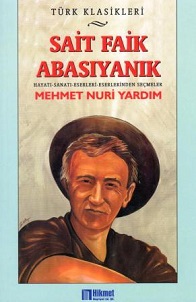
Sait Faik Abasıyanık (23 november 1906 – 11 mei 1954)
Cover
De Amerikaanse dichter, schrijver, vertaler, schilder en illustrator Guy Mattison Davenport werd geboren op 23 november 1927 in Anderson, South Carolina. Zie ook alle tags voor Guy Davenport op dit blog en ook mijn blog van 23 november 2010.
Uit: Carmina Archilochi: The Fragments of Archilochos
Stonewall
I do despise a tall general,
One of those swaggerers,
A curly-haired, cheek-frilled
Whisker dandy.
For me a proper officer’s
Short and bow-legged,
Both feet planted well apart,
Tough in the guts.
Euboians
no bowstrings drawn to the bow-notch
no slings whipped
in a battle with Ares egging on
but a hell of a lot of sword work
and spear sticking
when the fight’s with
those Euboians
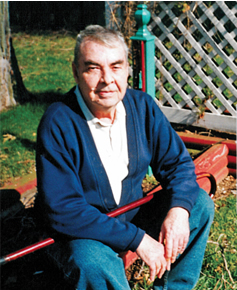
Guy Davenport (23 november 1927 – 4 januari 2005)
De Schotse schrijver en historicus Nigel Tranter werd geboren op 23 november 1909 in Glasgow. Zie ook alle tags voor Nigel Tranter op dit blog en ook mijn blog van 23 november 2010.
Uit:The Bruce Trilogy
“What say you to this?” Bruce held out his signed bond, and the enclosing letter to Edward.
Comyn’s swiftly indrawn breath was as eloquent as any words. He stared at the out-thrust offering.
“I am waiting?”
His opponent moistened his lips. “Where … did you… get that?” be got out.
“What matters it? Since I have it now.”
“I have been betrayed, then…”
“Betrayed! You to speak of betrayal! You, who made this compact with me. To be your King! And then betrayed me to Edward, to a certain death! Lamberton also-since he signed witness.”
“Faugh! To betray traitors is no fault I” “Traitors! You name me traitor? Is it possible . . .that this forsworn wretch … should so name Bruce?” And his hand rose to point a quivering finger at the other.
Swift as thought Comyn smashed down the accusing hand with his own clenched fist -his left, since his right was still clutching the dagger-haft.
“Aye-traitor, as I have ever known you! Sold to Edward always. Sold, for his favour. And his Ulsterwoman de Burgh.. !”
Whether at the snarling mention of Elizabeth’s name, or at the physical blow to his arm, the second such that Comyn had struck him, something snapped in Bruce’s overwrought brain as surely as a breaking bowstring, releasing a scalding red tide which rose swiftly to engulf him. The tingling downstruck hand went straight to his dagger. Scarcely knowing what he did, certainly not hearing the cries from the doorway, he whipped out the weapon and, beating aside the still upraised hand that had struck him, drove the steel deep into John Comyn’s breast.”
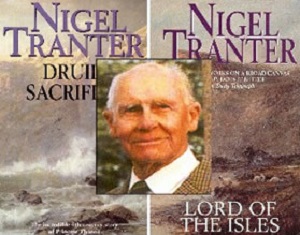
Nigel Tranter (23 november 1909 – 9 januari 2000)
Cover
De Duitse schrijfster Marieluise Fleißer werd geboren op 23 november 1901 in Ingolstadt. Zie ook alle tags voor Marieluise Fleißer op dit blog en ook mijn blog van 23 november 2010.
Uit: Hiltrud Häntzschel: Marieluise Fleißer. Eine Biographie
„Freilich: Viel größer als die in den 90er Jahren des 20. Jahrhunderts neu entdeckten Korrespondenzen sind die Lücken, die Leerstellen im biografischen Material. Man muss sich darüber im Klaren sein: Für die Zeit von der Kindheit bis zum ersten Höhepunkt ihrer Laufbahn und ihrer tiefen Zäsur 1929 ist bislang in öffentlich zugänglichen Nachlässen ein einziger privater Brief von Marieluise Fleißer bekannt, 1926 an den Vater aus Berlin, und auch er berichtet ausschließlich von Beruflichem. Von einem Tagebuch ganz zu schweigen. Kein einziger Brief an einen jener Männer, zu denen sie in dieser Zeit in enger Verbindung stand, ist erhalten, keiner an Alexander Weicker, keiner an Lion Feuchtwanger, keiner an Bert Brecht, an Hannes Küpper, an Bode Uhse, auch keiner an Bepp Haindl.“
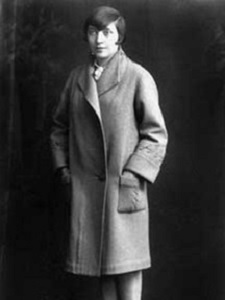
Marieluise Fleißer (23 november 1901 – 2 februari 1974)
De Bengaals-Indische schrijver Nirad C. Chaudhuri werd geboren op 23 november 1897 in Kishoreganj. Zie ook alle tags voor Nirad C. Chaudhuri op dit blog.
Uit: Three Horsemen Of The New Apocalypse
“Its restoration as intended by those who brought in the new government in 1967, was to install a figurehead to their government. Instead it produced the opposite result. In making Indira Gandhi, the sweet and gracious daughter of Nehru, prime minister of India, they caught a Tartar. The position brought about a transformation in Mrs Gandhi’s character paralleled only by the promising Ivan Romanov’s becoming Ivan the Terrible. The Indian Boyars were routed.
Mrs Gandhi’s sole preoccupation was to remain in office and in power by foiling the Hydra-headed opposition to her in a faction-ridden political world. This made her resort to such unscrupulous yet imprudent manoeuvres that she was murdered by agents of the fanatical Akali Sikhs.
The answer is simple: the inevitable consequences of the disappearance of personal rule in Indian political life has been seen to be rule by a faction or an opportunistic combination of many factions.
But it is now a very exceptional kind of factional government. During the period of Mogul rule there were three factions at the court — the Turani or Turkish, the Irani or Persian, or Hindustani, Indian — all Muslims, of course. At present there is a very broad line of separation, viz between the factions in the Indo-Gangetic plain, or Hindustan, or Aryavarta on the one hand; and on the other, the factions from the peripheral provinces. But the present government in India is dominantly government by politicians from the Deccan. The north as a whole is the Opposition today.”
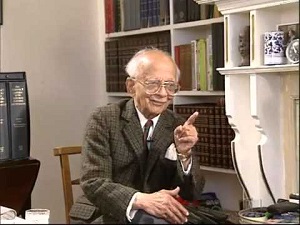
Nirad C. Chaudhuri (23 november 1897 – 1 augustus 1999)
